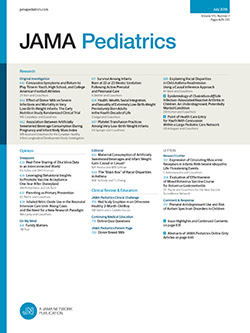Clinical Actionability of Genetic Findings in Cerebral Palsy
IF 24.7
1区 医学
Q1 PEDIATRICS
引用次数: 0
Abstract
ImportanceSingle gene variants can cause cerebral palsy (CP) phenotypes, yet the impact of genetic diagnosis on CP clinical management has not been systematically evaluated.ObjectiveTo evaluate how frequently genetic testing results would prompt changes in care for individuals with CP and the clinical utility of precision medicine therapies.Data SourcesPublished pathogenic or likely pathogenic variants in OMIM genes identified with exome sequencing in clinical (n = 1345) or research (n = 496) cohorts of CP were analyzed. A systematic literature review for evidence of effective therapies for specific genetic etiologies was performed.Study SelectionNonstandard interventions that led to a detectable improvement in a defined outcome in individuals with variants in the gene of interest were included.Data Extraction and SynthesisLiterature was evaluated using PRISMA guidelines. A diverse, expert working group was established, scoring rubrics adapted, and scoring consensus built with a modified Delphi approach.Main Outcomes and MeasuresOverall clinical utility was calculated from metrics assessing outcome severity if left untreated, safety and practicality of the intervention, and anticipated intervention efficacy on a scale from 0 to 3.ResultsOf 1841 patients with CP who underwent exome sequencing, 502 (27%) had pathogenic or likely pathogenic variants related to their phenotype. A total of 243 different genes were identified. In 1841 patients with identified genetic etiologies of CP, 140 (8%) had a genetic etiology classified as actionable, defined as prompting a change in clinical management. Also identified were 58 of 243 genes with pathogenic or likely pathogenic variants with actionable treatment options: 16 targeting the primary disease mechanism, 16 with specific prevention strategies, and 26 with specific symptom management. The level of evidence was also graded according to ClinGen criteria; 45 of 101 interventions (44.6%) had evidence class D or below. The potential interventions have clinical utility with 98 of 101 outcomes (97%) being moderate-high severity if left untreated and 63 of 101 interventions (62%) predicted to be of moderate-high efficacy. Most interventions (72 of 101 [71%]) were considered moderate-high safety and practicality.Conclusions and RelevanceThe findings indicate that actionable genetic findings occurred in 8% of individuals referred for genetic testing with CP. Evaluation of potential efficacy, outcome severity, and intervention safety and practicality indicates moderate-high clinical utility of these genetic findings. Genetic sequencing can identify precision medicine interventions that provide clinical benefit to individuals with CP. The relatively limited evidence base underscores the need for additional research.脑瘫遗传发现的临床可操作性
单基因变异可引起脑瘫(CP)表型,但基因诊断对脑瘫临床管理的影响尚未得到系统评估。目的评估基因检测结果对CP患者护理改变的频率以及精准医学治疗的临床应用。数据来源对临床(n = 1345)或研究(n = 496) CP队列中经外显子组测序鉴定的OMIM基因中已发表的致病性或可能致病性变异进行分析。一个系统的文献综述的证据有效治疗特定的遗传病因进行。研究选择包括在有目标基因变异的个体中导致可检测到的特定结果改善的非标准干预措施。数据提取和综合使用PRISMA指南对文献进行评估。建立了一个多样化的专家工作组,调整了评分标准,并采用改进的德尔菲方法建立了评分共识。主要结果和测量方法总体临床效用是根据评估结果严重程度(如果不治疗)、干预的安全性和实用性以及预期干预效果(从0到3)的指标来计算的。结果对1841例CP患者进行了外显子组测序,其中502例(27%)具有与其表型相关的致病性或可能致病性变异。共鉴定出243个不同的基因。在1841例已确定遗传病因的CP患者中,140例(8%)的遗传病因被归类为可操作的,定义为促使临床管理发生变化。还确定了243个具有致病性或可能致病性变异的基因中的58个具有可操作的治疗方案:16个针对原发疾病机制,16个具有特定预防策略,26个具有特定症状管理。证据水平也根据克林根标准进行分级;101项干预措施中有45项(44.6%)的证据等级为D级或以下。这些潜在的干预措施具有临床效用,如果不及时治疗,101项干预措施中有98项(97%)为中-高严重程度,101项干预措施中有63项(62%)预计为中-高疗效。大多数干预措施(72 / 101[71%])被认为是中高安全性和实用性。结论和相关性研究结果表明,在接受CP基因检测的个体中,有8%出现了可操作的基因发现。对潜在疗效、结果严重程度、干预安全性和实用性的评估表明,这些基因发现具有中高水平的临床应用价值。基因测序可以确定精确的医学干预措施,为CP患者提供临床益处。相对有限的证据基础强调了进一步研究的必要性。
本文章由计算机程序翻译,如有差异,请以英文原文为准。
求助全文
约1分钟内获得全文
求助全文
来源期刊

JAMA Pediatrics
PEDIATRICS-
CiteScore
31.60
自引率
1.90%
发文量
357
期刊介绍:
JAMA Pediatrics, the oldest continuously published pediatric journal in the US since 1911, is an international peer-reviewed publication and a part of the JAMA Network. Published weekly online and in 12 issues annually, it garners over 8.4 million article views and downloads yearly. All research articles become freely accessible online after 12 months without any author fees, and through the WHO's HINARI program, the online version is accessible to institutions in developing countries.
With a focus on advancing the health of infants, children, and adolescents, JAMA Pediatrics serves as a platform for discussing crucial issues and policies in child and adolescent health care. Leveraging the latest technology, it ensures timely access to information for its readers worldwide.
 求助内容:
求助内容: 应助结果提醒方式:
应助结果提醒方式:


